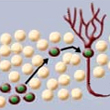Monday, 17 December 2012
Neurogenesis and Depression
 The processes leading to the many different illnesses that can affect people’s psychic equilibrium are still hotly debated. Often, these processes involve multiple contributing factors which is why there are so many different hypotheses about them. In the case of depression, for example, one of the best known is the monoamine hypothesis, which associates the disease with underactivity of certain neurotransmitters. such as serotonin.
The processes leading to the many different illnesses that can affect people’s psychic equilibrium are still hotly debated. Often, these processes involve multiple contributing factors which is why there are so many different hypotheses about them. In the case of depression, for example, one of the best known is the monoamine hypothesis, which associates the disease with underactivity of certain neurotransmitters. such as serotonin.
Several research laboratories are now working on a more recent hypothesis about the cause of depression, involving a phenomenon that was first confirmed in humans in the late 1990s: neurogenesis, meaning the birth of new neurons in the adult brain. The starting point for this hypothesis is that these young neurons seem to show greater plasticity and are found only in certain parts of the brain, such as the dentate gyrus of the hippocampus, that are associated with emotions.
Researchers have shown for example, that stress, which is an aggravating factor in depression, also reduces neurogenesis in the hippocampus. while antidepressants, which often improve the symptoms of depression, also increase neurogenesis. Even the relatively long time needed for antidepressants to take effect (around 3 to 6 weeks) might reflect the time needed for the neurons created by neurogenesis to mature and become functional.
Thus many phenomena converge to support the idea that a reduction in the rate of neurogenesis in the hippocampus may help to accentuate the symptoms, or at least the cognitive ones. A recent study has also confirmed the involvement of the glucocorticoid receptor in the cascade of biochemical reactions that is caused by an SSRI and that encourages the differentiation of new neurons in the hippocampus.
Living with depression can be incredibly difficult, for both those suffering and those around them. Speaking to a professional, whether that’s your GP or a counsellor, can help you understand what you need. By talking through our problems, we better understand ourselves and, with guidance, are often able to make changes that improve our daily lives. Depression counselling can help you deal with any negative thoughts and feelings and/or provide objective guidance towards your personal growth. This can range from self-help tips and breathing exercises, to a course of psychotherapy and medication. Everyone is different and will need differing levels of support.
![]() New neurons and a new therapeutic target
New neurons and a new therapeutic target
![]() Chronic stress, neurogenesis and depression
Chronic stress, neurogenesis and depression
![]() Antidepressants increase human hippocampal neurogenesis by activating the glucocorticoid receptor
Antidepressants increase human hippocampal neurogenesis by activating the glucocorticoid receptor
Memory and the Brain, Mental Disorders | Comments Closed








